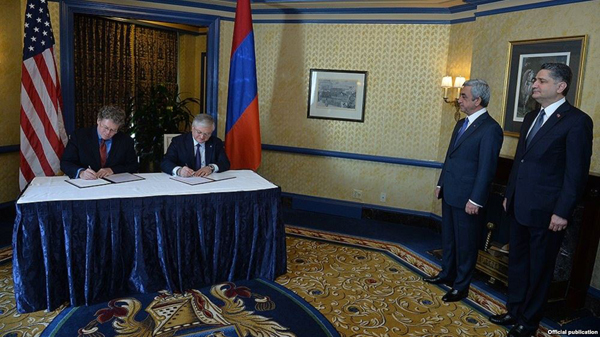WASHINGTON, DC — On May 7, FM Edward Nalbandian who is in Washington DC (within the delegation headed by President Serzh Sarkisian) and Assistant United States Trade Representative Dan Mullaney, in presence of the President of the Armenia, signed Trade and Investments Framework Agreement between the Republic of Armenia and the United States of America.
By the Agreement Armenia and the United States affirm their intention to create investment friendly environment and promotion of turnover and trade between the two states.
“Today’s agreement provides a vehicle for deepening and broadening U.S.-Armenia trade and investment relations,” Mullaney said in a statement released after the ceremony.
Under the agreement, the U.S. and Armenian governments will set up a joint Council on Trade and Investment that will meet at least once a year to address obstacles to U.S.-Armenian trade and explore other ways of deepening economic ties between the two countries.
Mullaney said he expects the council to “unlock opportunities for workers, farmers, service providers, manufacturers and consumers in our two countries.” The Armenian Foreign Ministry likewise said the body will strive to put in place more favorable conditions for bilateral commerce and investments.
According to Armenian government statistics, the U.S. accounted for about 4 percent of Armenia’s foreign trade last year. The total volume of bilateral commercial exchange fell by 2.5 percent to $221 million.
The Office of the U.S. Trade Representative reported an even more modest trade figure: $153 million. “U.S. goods imports from Armenia in 2014 totaled $96 million in 2014 and included aluminum, woven apparel, brandy, diamonds, and processed fruit and vegetables,” it said.
Tigran Jrbashian, the chairman of American Chamber of Commerce in Armenia (AmCham), said the TIFA should lead to a significant increase in these figures and thereby benefit the struggling Armenian economy. In particular, he said, Armenian can now use the agreement to expand its coverage by the U.S. Generalized System of Preferences (GSP), which has fully or partly exempted many goods manufactured by developing countries from U.S import duties.
“Armenian companies seeking to export their goods to the U.S. will now be able to raise their issues with the U.S.-Armenian Council on Trade and Investment and try to secure additional export privileges,” Jrbashian told RFE/RL’s Armenian service (Azatutyun.am).
The GSP expired in July 2013. The Obama administration has since been working with the U.S. Congress to try to revive the scheme.
Jrbashian referred to Armenia’s burgeoning information technology (IT) sector as another major beneficiary of the TIFA. He said that under the trade deal software and other output of American hi-tech firms dominating the sector will now be protected by U.S. laws on intellectual property.
Jrbashian further argued that the deal will make it easier for the U.S. Export-Import Bank to finance U.S. investment projects in Armenia.










